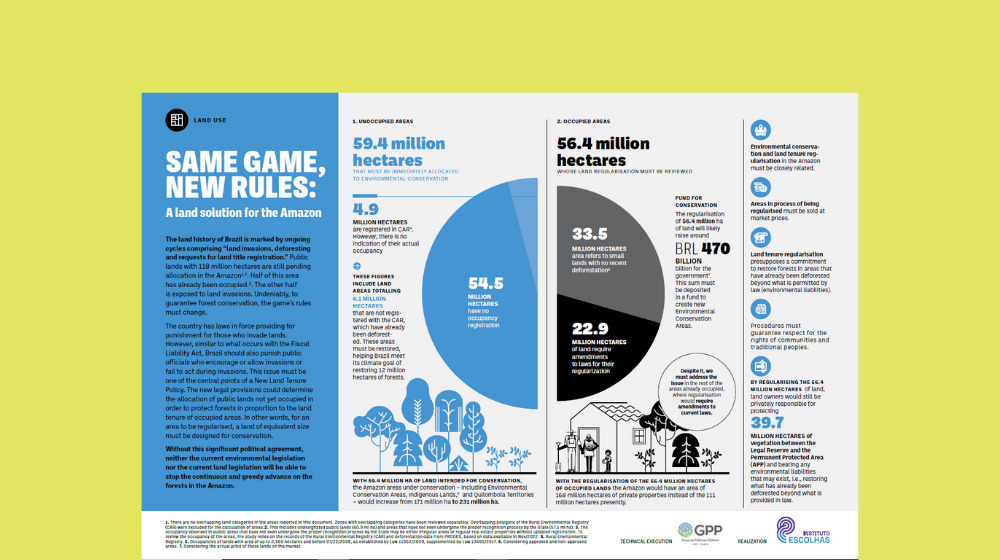Instituto Escolhas proposes New Land Tenure Policy for the Amazon

Almost a quarter of the Brazilian Amazon, or 118 million hectares, is public land with no defined destination. Therefore, the area is exposed to land invasions. More than 50 million hectares have already been occupied, while the omissive and inactive attitude of the State – which does not provide for their destination – fuels the old cycle of advances on the forest: first, the land is occupied, then deforested, and, years later, part of the area ends up being regularized at a bargain price. Something is wrong, and the country’s land claim situation must be urgently reviewed. This is what the publication “Same game, new rules: a land solution for the Amazon” proposes, released by Instituto Escolhas and conducted in partnership with the Public Policies Group of ESALQ/USP.
“The Brazilian State fails when it does not allocate its lands for environmental conservation or other uses. Furthermore, what could they do now when most of the area has already been occupied? Factually, we are talking about a political agreement to deal with this scenario if we want to have any actual chance of keeping the remaining standing forest,” explains Larissa Rodrigues, Portfolio Manager, Instituto Escolhas, and responsible for the research that gave rise to the publication. “We propose to grant lands, on the one hand, regularizing the occupations that have already occurred, but following new parameters. Meanwhile, on the other hand, we will ensure definitive protection in the areas not yet occupied, putting an end to the current lack of definition,” stated her.
For Ms. Rodrigues, the State keeps a stock of land as an ace and distributes the land according to the needs and interests in their agenda. “The problem is that these are government-owned lands, and we cannot let forests be a bargaining chip”. She further warns that “both the environment and those who need regularized land to produce lose out.”
The figures of the agreement
According to the study, the Amazon has 59.4 million hectares of public land that has neither been allocated nor occupied. These areas must be immediately allocated to environmental conservation. Land regularization must be evaluated concerning the other 56.4 million hectares of land that have already been occupied. “Otherwise, the ‘occupy, deforest and regularize’ cycle will never end,” says Ms. Rodrigues.
With the above allocation implemented, the Amazon would have 231 million hectares protected, including Conservation Units, Indigenous Lands, and Quilombola Territories. Today, the protected area comprises 171 million hectares.
With the allocation of 56.4 million hectares for land regularization, the owners of the new properties would be responsible for protecting 39.7 million hectares of vegetation – between Legal Reserve and Permanent Conservation Area (APP) – in addition to bearing likely environmental liabilities. In other words, a deforested area beyond what is provided in law would be recovered. Escolhas proposes that regularization considers the actual value of land on the market, generating revenue of BRL470 billion (USD 93 billion) for the government.
“We are talking about an extensive area of public land already occupied. Despite enforcement efforts, this shows that the rules are not being followed. We need to deal with the problem using new strategies. When we talk about a New Land Tenure Policy, we also talk about punishing public agents who do not act in compliance with the defined protection and economic use obligations”, states Ms. Rodrigues.
Read the document here.
Related
Brazil attended COP-6 in Minamata without presenting an action plan to address mercury usage in mining
Study shows 2,274% increase in herbicide use for soybean production
Technical assistance is prevalent in legal regulations and public policies; however, a study indicates that it does not adequately reach rural producers
Study reveals Brazil applies pesticides and fertilizers inefficiently and unsustainably in soybean farming

 Texto
Texto